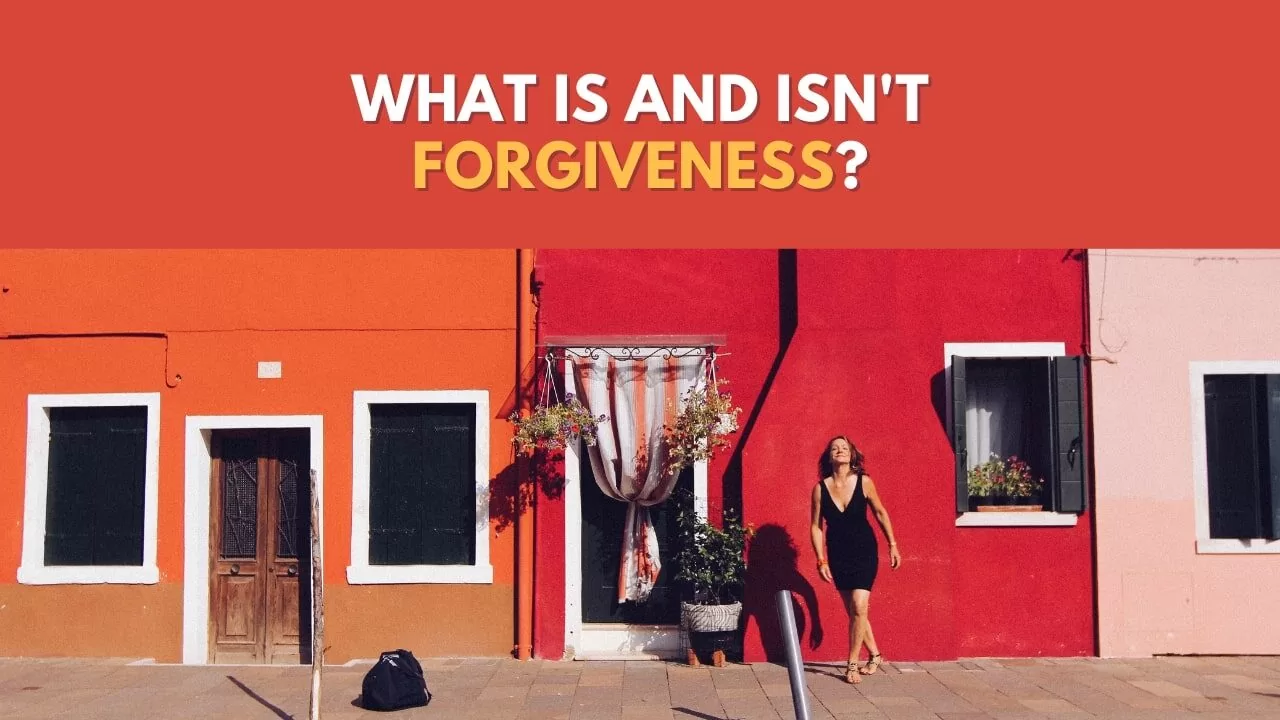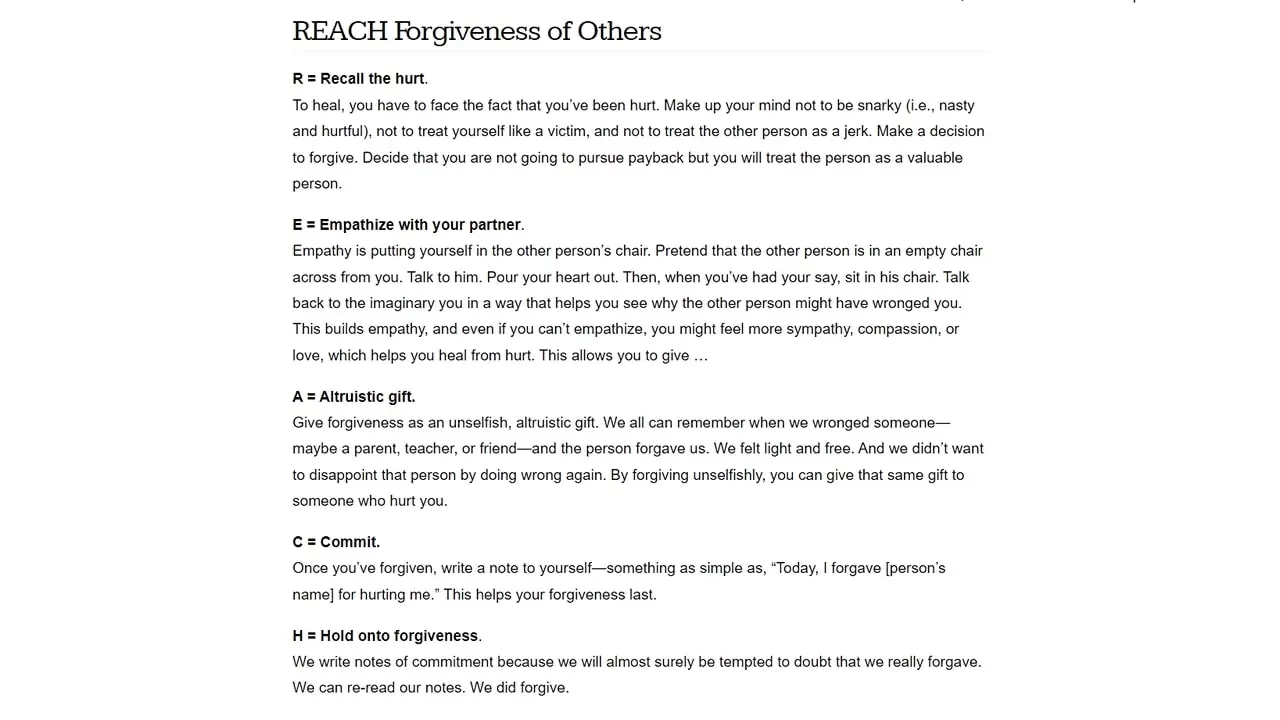Today's Monday • 10 mins read
Forgiveness is a popular, if divisive, topic in the media and in society.
Most people place great value on forgiveness. Yet most find it difficult to forgive. Many hold that we do not need to forgive everyone who wronged us. Some of us feel that we should not forgive even a single person in our lives.
Think about this: does a cheater deserve your forgiveness? How does that divide your thoughts?
We read about criminals who receive pardons from the victims or the victim’s families. Their victims had suffered brutally as a result of their acts, and in some cases had even died. In most such cases, the reason for the forgiveness is a desire to move on with their lives and have a better tomorrow.
However, many of us have wondered over the years whether forgiveness is a sign of weakness.

What Forgiveness Is Not?
Most of us have a fair idea that forgiveness involves deciding to let go of feelings of resentment and thoughts of revenge.
However, most of us do not know that forgiveness is not giving a pardon, condoning, excusing, or reconciling.
Most psychologists concur with Enright, Gassin, and Wu (1992) that forgiveness is distinct from pardon (which is more apposite to the legal realm), condonation (which implies justifying the transgression), and excusing (which implies recognition that the transgressor had a good reason for committing the transgression). It is also distinct from reconciliation, which is a term implying the restoration of a relationship.
— Michael E. McCullough, 2001
Before deciding whether to forgive, be aware of the things that forgiveness does not apply to:
1. To forgive is not a favor you do for the other person—you do it for yourself.
Forgiving someone is not an act of altruism; it is rather an act of self-preservation. To not forgive is to hold on to a grudge and a memory that always hurts.
“It (forgiveness) is an active process in which you make a conscious decision to let go of negative feelings, whether the person deserves it or not.”
— Karen Swartz, Professor of Psychiatry and Behavioral Sciences at The Johns Hopkins Hospital
When you hold on to your baggage of negative emotions, like anger and grudge, you find it hard to move forward in life. But when you forgive, you leave behind the emotional pain of the experience. Its memory is now only a learning experience.
Forgiving doesn’t mean you have to like the person again, as you lose your hatred and anger for them. It means you accept that the person is different from you to have acted that way.
Forgiveness implies that you no longer want them to occupy space in your mind.
2. Forgiving does not mean you have condoned or pardoned a wrongdoer’s actions.
To condone is to disregard or overlook something. If someone condones immoral and unethical behavior, it indicates they accept it and enable it to happen.
Forgiving does not imply condoning the actions of your violator. When you forgive, it does not mean you deem their behavior acceptable and unpunishable.
Forgiveness does not need you to justify the actions of the offender. By forgiving, you are not agreeing that you will accept and forgive their similar future sins as well.
3. True forgiveness should not be an enforced or manipulated act, but a conscious decision.
Forgiveness is a completely intentional choice.
The hurt person must have total freedom to forgive, or not forgive, and must be the only one who can take the initiative to do so.
The offender, or someone who favors them, must not compel or influence you into forgiving them.
An immediate apology may hasten forgiveness. Sincere and repeated requests for forgiveness can inspire a person to consider forgiving. But an apology should never be used as a tool to demand a pardon.
True forgiveness does not depend on the person who inflicted the wound, whether they seek it or not.
4. When you forgive, it does not imply everything is fine now, with nothing else left to discuss.
Forgiveness is not an instant process of rewinding and undoing. It’s true that it is not always possible to forgive, and we struggle with this throughout our lives.
You may have been the victim of severe abuse by a parent or a partner. When it came to forgiving them, you always wondered, “How can I forgive those who bullied me when I was helpless?”
Forgiving a parent for childhood bullying does not mean you also permit them to say or do anything from now on. They will never have the right to tell you that your parenting style will spoil your children.
Forgiving a partner or an ex-partner does not give them the right to be irresponsible with you in the future. Nor does it mean that you have no more issues to discuss with them.
5. Forgiveness does not mean you forget the incident.
Forgiveness does not include forgetting the incident.
We often hear the expression “forgive and forget.” But forgiving does not include forgetting the wrongdoing. Forgiveness does not mean you have to forget the injustice or its past effects.
Forgiveness is not erasing the incident from your memory. At the same time, it is also not letting it affect your present.
When people forgive, they may want to remember the event. Doing so can help them avoid allowing someone else, or even themselves, to make the same mistake again.
Forgiving someone does not absolve them of all responsibility for their actions. It allows both of you to move on with your lives.
6. Forgiveness does not include the condition that you must notify the person you have forgiven them.
Forgiving someone does not imply that you have to tell your offender that you have forgiven them. It makes little difference if the person you forgave is aware of your forgiveness.
Forgiveness is first and foremost for you, not for them. It is an act of letting go and does not have to be a two-way street.
Forgiveness is an act of self-care, something that you do only for yourself. You do not have to include the person who wronged you in your self-healing process.
Your pardon is enough in itself. There is no need for your offender to accept your forgiveness for your pardon to be complete.
Forgiving also does not oblige you to remain silent about their future misdeeds, if you choose to be with them. Make it clear that you want them to treat you with fairness and kindness from now on.
Tell them you do not want to have your feelings hurt again. If they still mistreat you, do not hesitate to speak up or break up with them.
7. Forgiving does not mean you have to interact with the person who has wronged you, or they can re-establish a connection with you.
Forgiving does not need you and your perpetrator to re-establish contact if you broke up.
Forgiveness is about not freezing yourself inside that moment. It is about not keeping the anger and bitterness bottled up.
As Buddha said, holding on to anger is like grasping a hot coal with the intent of throwing it at someone else; you are the one who gets burned.
Forgiving someone does not mean you must now get back with them, and both act as if nothing has happened. Nor does it mean that they can return to your life whenever they choose.
Even if they apologize and make amends, it is always your choice to allow them into your life, and forgive them or not.
Is forgiving someone a sign of weakness?
No, forgiveness is not a sign of weakness. It can replenish us by helping in the healing of our emotional trauma and protecting against future upsets. Forgiving releases the associated regret, hatred, and anger. People receiving forgiveness training become emotionally stronger, more confident, and more optimistic (Luskin, 2003).
An act of pardon can make us feel more positive and hopeful about life.
According to studies, forgiveness can have a significant impact on your physical and mental health. It can lower your chance of a heart attack, decrease cholesterol levels and blood pressure, reduce anxiety and depression, and improve sleep and inner peace.
What Is Forgiveness?
Forgiveness is a conscious, intentional decision to let go of feelings of grudge or revenge. Forgiving the person or group who has hurt you does not mean they deserve your forgiveness. Robert Enright’s Process Model of Psychological Forgiveness and Everett Worthington’s REACH Forgiveness approach are the two most widely used forgiveness training techniques.
Today, many scholars see two stages of forgiveness:
- Decision stage: when one must decide whether to forgive someone for a hurtful act, or not.
- Emotional forgiveness: when one gradually replaces the unforgiving feelings (resentment, bitterness, or anger) with positive emotions (empathy, compassion, and even affection) for the offender.

In the REACH model, R stands for recalling the hurt, E for empathizing with the partner, A for the altruistic gift of forgiveness, C for commitment to your forgiveness, and H for holding on to forgiveness.
The steps of forgiveness are not set in stone and vary from person to person. However, there is a consensus that people go through the following stages of emotional forgiveness:
1. Recognizing the effects of the hurtful act, and feeling the brunt of negative emotions that resulted from it.
2. Feeling anger and pain at the person for violating their moral code of conduct, crossing the safety boundaries, and undermining mutual trust.
3. Working through these emotions with oneself and others (other people who are supportive, or mental health professionals).
4. Developing empathy for the perpetrator. Empathy does not mean having compassion for the abuser, but having an understanding of what their thoughts and feelings were when they carried out that act.
5. Making peace with oneself, by letting go of regret, grief, anger, or any other negative emotions, and forgiving them without initiating any contact with them.
Forgiveness relates to a sense of goodwill, relief, and contentment. A decision to forgive indicates your unwillingness to punish the one who has wronged you in some way. Your forgiveness allows you to let go of resentment and vengeance.
Forgiveness is often hard work. But always keep in mind that forgiving means working toward the goal of improving your physical and emotional well-being.
How To Forgive Yourself For Hurting Someone Unintentionally?
What is forgiving?
Psychologists consider forgiveness to be a complex process that can have significant benefits for both the forgiver and the person who is forgiven.
Final Words
Finally, forgiveness is accepting the present reality and finding a way out of your mental turmoil. This may be a time-consuming process, but it is the only way forward.
Forgiving means both of you can move on with your lives. When you forgive someone, you are no longer attached to the negative emotions that fueled the conflict in the first place.
Remember, refusing to forgive is to imprison yourself in your own pain.
• • •
Author Bio: Written and reviewed by Sandip Roy—a medical doctor, psychology writer, and happiness researcher. Founder and Chief Editor of The Happiness Blog. Writes on mental health, happiness, positive psychology, and philosophy (especially Stoicism).
√ If you enjoyed this, please share it on Facebook or Twitter or LinkedIn.